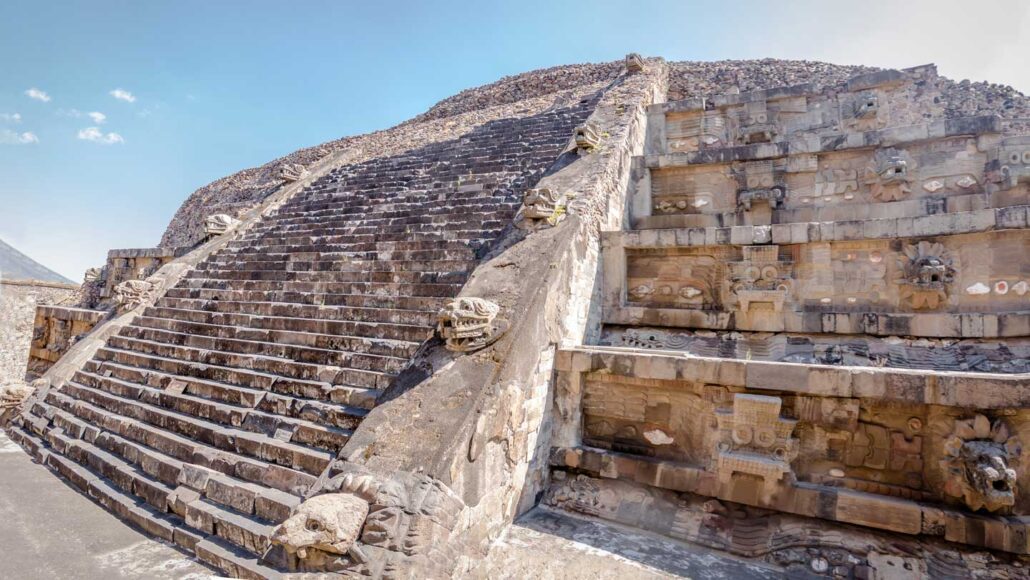Welcome to DU!
The truly grassroots left-of-center political community where regular people, not algorithms, drive the discussions and set the standards.
Join the community:
Create a free account
Support DU (and get rid of ads!):
Become a Star Member
Latest Breaking News
Editorials & Other Articles
General Discussion
The DU Lounge
All Forums
Issue Forums
Culture Forums
Alliance Forums
Region Forums
Support Forums
Help & Search
Anthropology
Related: About this forumThe Maya: History, civilization & gods
By Owen Jarus , All About History 2 days ago
The Maya civilization stretched throughout Central America and reached its peak during the first millennium A.D.

A mask of the rain god Chac decorates the facade of a pyramid at North Acropolis, in Mayan ruins, located in Tikal, Guatemala. (Image credit: Independent Picture Service/Universal Images Group via Getty Images)
The term "Maya" refers to both a modern-day group of people who live across the globe and their ancestors who built an ancient civilization that stretched across much of Central America. The Maya civilization reached its peak during the first millennium A.D., and Maya ruins can still be seen across Central America.
The Maya civilization was never unified; instead it consisted of numerous small states, each centered on a city ruled by a king. Sometimes, a stronger Maya state would dominate a weaker state and demand tribute and labor from it.
(Short very interesting video of of Tikal, Guatemala using LIDAR photography)
Nomadic hunter-gatherers had a presence in Central America for thousands of years. However, permanent village really took off when these people began cultivating maize in what archaeologists call the Preclassic period (1800 B.C. to A.D. 250). This lead to the creation of early Maya cities.
"Effective farming, as expressed by densely inhabited villages, was an innovation of the Preclassic period," wrote Michael Coe, the late emeritus professor of anthropology at Yale University, in his book "The Maya" (Thames and Hudson, 2015).
More:
https://www.livescience.com/41781-the-maya.html
InfoView thread info, including edit history
TrashPut this thread in your Trash Can (My DU » Trash Can)
BookmarkAdd this thread to your Bookmarks (My DU » Bookmarks)
1 replies, 895 views
ShareGet links to this post and/or share on social media
AlertAlert this post for a rule violation
PowersThere are no powers you can use on this post
EditCannot edit other people's posts
ReplyReply to this post
EditCannot edit other people's posts
Rec (4)
ReplyReply to this post
1 replies
 = new reply since forum marked as read
Highlight:
NoneDon't highlight anything
5 newestHighlight 5 most recent replies
= new reply since forum marked as read
Highlight:
NoneDon't highlight anything
5 newestHighlight 5 most recent replies
The Maya: History, civilization & gods (Original Post)
Judi Lynn
Oct 2021
OP
Judi Lynn
(162,381 posts)1. Lasers reveal construction inspired by ancient Mexican pyramids in Maya ruins
Scaled-down cousin of Teotihuacan’s Temple of the Feathered Serpent found in Guatemala
Temple of the Feathered Serpent against a sunny backdrop

The Temple of the Feathered Serpent (shown) is the smallest of the three giant pyramids at the ancient Mexican city of Teotihuacan.
DIEGOGRANDI/ISTOCK/GETTY IMAGES PLUS
By Meghie Rodrigues
OCTOBER 22, 2021 AT 6:00 AM
At Teotihuacan, near Mexico City, three giant pyramids rise above the ancient city’s main street, the Avenue of the Dead. The smallest of these is the Temple of the Feathered Serpent, which sits within La Ciudadela, or the Citadel, a massive sunken plaza with tall walls.
Now, more than a thousand kilometers away at the Maya capital of Tikal in what’s now Guatemala, researchers have found a smaller plaza and pyramid possibly modeled after La Ciudadela and its temple.
Teotihuacan is thought to have conquered Tikal in the year 378 (SN: 9/27/18). The finding adds to evidence of Teotihuacan’s influence over Tikal, the team reports September 28 in Antiquity.
“The architectural layout revealed by this study is stunning,” says anthropological archaeologist Nawa Sugiyama of the University of California, Riverside, who was not involved in the new research. “The very orthogonal city planning with specific orientation of the pyramids gives Teotihuacan a very characteristic architectural style, making it easy to identify any Teotihuacan influence abroad.”
More:
https://www.sciencenews.org/article/lasers-lidar-mexican-pyramid-maya-teotihuacan-temple-feathered-serpent-tikal